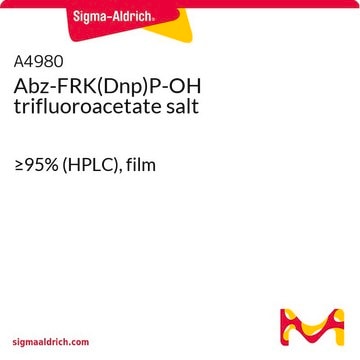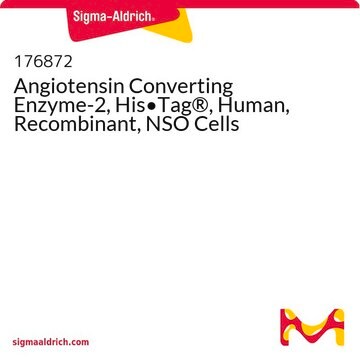CS0002
Angiotensin I Converting Enzyme (ACE) Activity Assay Kit (Fluorometric)
sufficient for 200 fluorometric tests
Sinónimos:
ACE Assay Kit
Iniciar sesiónpara Ver la Fijación de precios por contrato y de la organización
About This Item
UNSPSC Code:
12352202
NACRES:
NA.56
Productos recomendados
usage
sufficient for 200 fluorometric tests
shipped in
dry ice
storage temp.
−20°C
General description
The ACE Positive Control in the kit can be used to screen for ACE inhibitors. This kit has a linear range of 1.5-110 mU of ACE activity.
Angiotensin Converting Enzyme (ACE) is a key component in the renin-angiotensin system (RAS), which is well known for its role in the regulation of blood pressure, electrolyte balance, and vascular remodeling1,2 . ACE is located mainly in the capillaries of the lungs, but can also be found in endothelial and kidney epithelial cells3. This hormone system also regulates body fluids volume. Renin produces angiotensin I by cleaving several amino acids from angiotensinogen. ACE then hydrolyzes angiotensin I to yield active angiotensin II. Angiotensin II also stimulates the adrenal cortex to secrete aldosterone, which also causes an increase in blood pressure by stimulating sodium reabsorption by the kidney1. Since ACE exhibits critical functions regulating RAS, ACE inhibition has become a promising approach for drug targeting in the treatment of cardiovascular diseases such as hypertension, heart failure, and diabetic nephropathy.
The detection range : 1.5-110 mU of ACE activity.
Application
- Detection of ACE1 activity in Tissue/Cell lysates, Serum, Plasma
- Enables to screen for ACE inhibitors
Features and Benefits
Our economical ACE Kit also saves your time and efforts:
- A simple, quick, sensitive, and direct procedure for measuring ACE levels in a variety of samples such as serum and plasma
- Enables to screen for ACE inhibitors
- Supportive calculator (Click here to download a calculator excel file):will calculate the reagents needed according to your experimental needs, and analyses your results based on your experimental data!
- User friendly: No need to weigh or mix multiple reagents
- Quick instruction bench card – to assure your experimental success
- More experiments in one kit - contains sufficient reagents for 200 tests.
Unit Definition
One unit of ACE is defined as the amount of enzyme that releases 1 nmol of fluorescent product from the substrate, in 1 minute, under the assay conditions, at 37 °C.This kit contains sufficient reagents for 200 tests.
Storage Class
10 - Combustible liquids
flash_point_f
188.6 °F
flash_point_c
87 °C
Certificados de análisis (COA)
Busque Certificados de análisis (COA) introduciendo el número de lote del producto. Los números de lote se encuentran en la etiqueta del producto después de las palabras «Lot» o «Batch»
¿Ya tiene este producto?
Encuentre la documentación para los productos que ha comprado recientemente en la Biblioteca de documentos.
Los clientes también vieron
Flavia L Martins et al.
Bioscience reports, 41(12) (2021-11-10)
The angiotensin-converting enzyme (ACE)/Angiotensin II (Ang II) and angiotensin-converting enzyme 2 (ACE2)/angiotensin-(1-7) (Ang-(1-7)) pathways are coexpressed in most tissues. The balance between these pathways determines, at least in part, whether tissue damage will occur in response to pathological stimuli. The
Mitja M Zdouc et al.
Cell chemical biology, 28(5), 733-739 (2020-12-16)
Microbial natural products impress by their bioactivity, structural diversity, and ingenious biosynthesis. While screening the less exploited actinobacterial genus Planomonospora, two cyclopeptides were discovered, featuring an unusual Tyr-His biaryl bridging across a tripeptide scaffold, with the sequences N-acetyl-Tyr-Tyr-His and N-acetyl-Tyr-Phe-His.
Pradeep K Singh et al.
Neurobiology of disease, 139, 104833-104833 (2020-03-17)
Alzheimer's disease (AD) is characterized by the presence of proteinaceous brain deposits, brain atrophy, vascular dysfunction, and chronic inflammation. Along with cerebral inflammation, peripheral inflammation is also evident in many AD patients. Bradykinin, a proinflammatory plasma peptide, is also linked
Jorge L Díaz-Gómez et al.
Molecules (Basel, Switzerland), 25(22) (2020-11-25)
In this study, we characterized three novel peptides derived from the 19 kDa α-zein, and determined their bioactive profile in vitro and developed a structural model in silico. The peptides, 19ZP1, 19ZP2 and 19ZP3, formed α-helical structures and had positive
Guru Prasad Sharma et al.
International journal of radiation oncology, biology, physics, 113(1), 177-191 (2022-01-31)
Radiation-induced lung injury is a major dose-limiting toxicity for thoracic radiation therapy patients. In experimental models, treatment with angiotensin converting enzyme (ACE) inhibitors mitigates radiation pneumonitis; however, the mechanism of action is not well understood. Here, we evaluate the direct
Nuestro equipo de científicos tiene experiencia en todas las áreas de investigación: Ciencias de la vida, Ciencia de los materiales, Síntesis química, Cromatografía, Analítica y muchas otras.
Póngase en contacto con el Servicio técnico












